Shy kid to Fremantle coach: Justin Longmuir on footy, the farm and finding his voice
Justin Longmuir has heard the critics. That he’s dry, or doesn’t have the emotional range to be a great coach. The Freo coach tells SAM LANDSBERGER it simply doesn’t bother him.
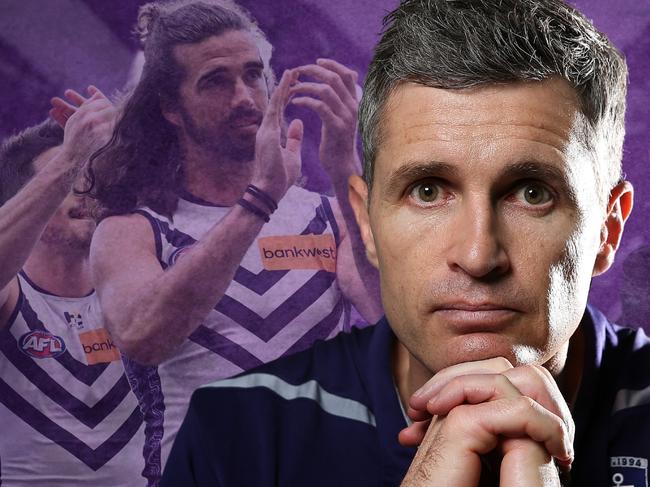
AFL
Don't miss out on the headlines from AFL. Followed categories will be added to My News.
Fair or unfair?
When Justin Longmuir joined Collingwood as backline coach in 2018 he needed to sharpen up his confidence and belief in front of the group.
“That’s fair,” Longmuir told this masthead.
“You become really comfortable with your line group because of the relationships and you’re doing it all the time. But in front of the group is a different kettle of fish.
“It was definitely something I needed to work on, absolutely.”
He did. In fact every RFI (room for improvement) fed to Longmuir got done quickly.
Why was it the biggest?
“Well, I’m an introvert,” Longmuir said.
“I’m an introvert, I’m an overthinker and I’m my own worst critic. So it all comes back to that.
“You always trace these things back to your childhood and it’s not as though I ever grew up doing any presentations or feeling comfortable in front of crowds because I never really had to do that as a young person.
“I always described my childhood as a really isolated childhood, which I loved. I was a very independent person as well.”
Longmuir grew up on a farm 45km north of Korda in Western Australia.
“I went to a school called Gabbin, which had about 16 kids by the time I finished,” he said.
“I was the only kid in year 7, there were some girls in year 6 and I was the only boy in year 5, 6 and 7.
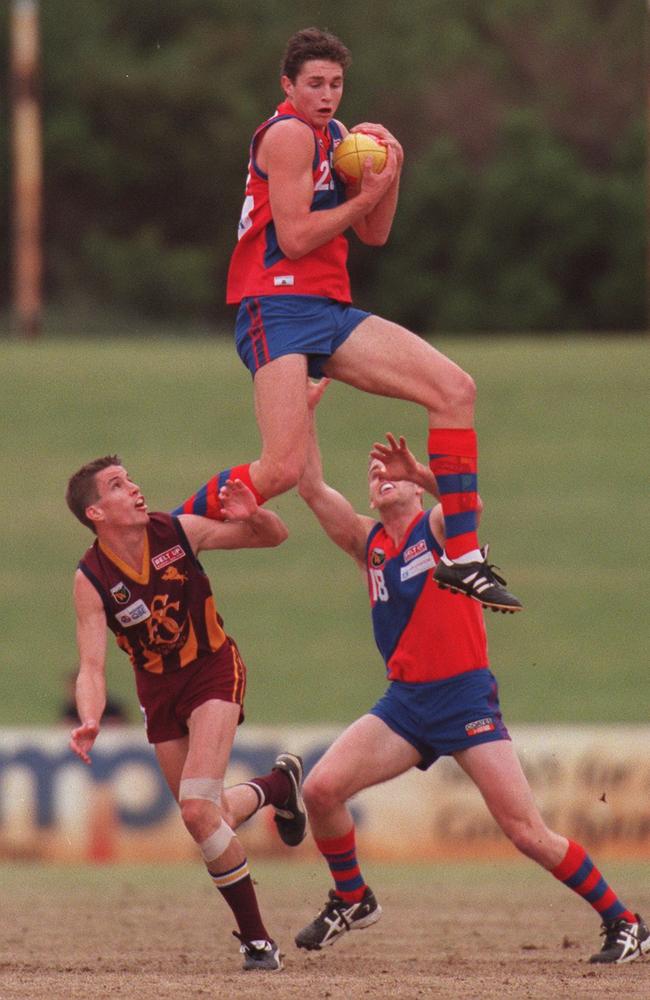
“The last couple of years weren’t overly eventful at primary school.”
Longmuir didn’t love school.
He liked football – every Saturday morning the Geelong supporter would write out his Cats team – but he loved the farm.
“I played footy because I was good at footy, but I worked really hard at it,” Longmuir said.
“I used to love sitting on the tractor listening to the footy. All you’d get was ABC radio but a couple of games back-to-back was like … this is living.”
Longmuir would fix old utes and pull apart motors for the fun of putting them back together. He wasn’t a great student because all he wanted to do was join dad back on the family farm.
He was there before and after school. Why was it so special?
“The love of the land, the lifestyle and the fact you get to do so many different things,” Longmuir said.
“There’s so much variance in what you do across the seasons. There was also that father-son aspect of it.
“When you go for this (senior coaching jobs) you have to reflect on why you do what you do and dad gave me a lot of autonomy as a kid to drive heavy machines and do jobs that were way above my age profile.
“I used to stuff a lot of things up that I had to try and fix myself. When you build that bond with Dad and he trusts you to do lots of different things you love it.”
So how did a shy boy from the Wheatbelt wind up an AFL senior coach? It started when Fremantle drafted Longmuir at pick No. 2 after a breakout WAFL Colts season for West Perth.
The plan was to sell farmland back home after hanging up the boots. But Longmuir retired at 26 due to a degenerative knee.
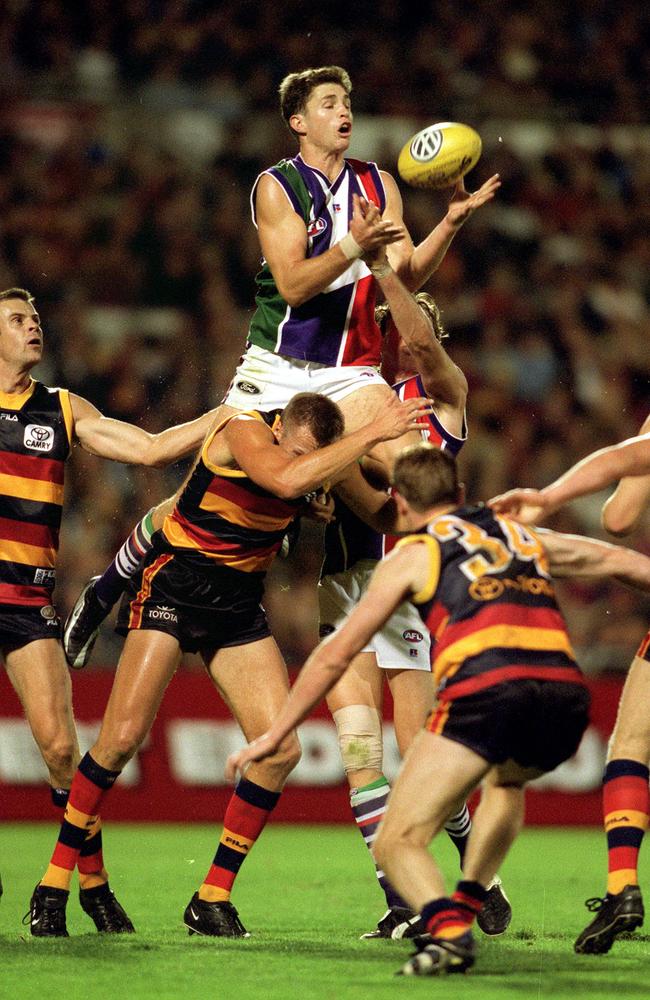
“One expert in Sydney said realistically you’re kidding yourself if you keep playing if you want to have a healthy life with kids. That hit home,” he said.
Fremantle’s three-year contract offer kept him in football and he moved into recruiting as the Dockers drafted 23 players in two years.
“It was a massive clean-out coming to the end of one generation and ‘Harvs’ (coach Mark Harvey) took over and brought in a lot of kids,” Longmuir said.
“Harvs doesn’t get any credit for that – but he had a really young group that he put two or three years into (before he was sacked for Ross Lyon).”
The Dockers chose Stephen Hill over Daniel Rich in 2008 and drafted Nat Fyfe in 2009.
Rich had won two senior WAFL flags for Subiaco whereas Hill – like Longmuir in 1998 – had come from the clouds.
“How do you weigh that up? It was a good initiation,” Longmuir said.
“Fyfe was a rangy half-forward. A bit undersized for a key forward – but he moved so well and just had these massive hands that would mark everything.”
Longmuir ruled out recruiting and real estate and in 2010 the Dockers let him coach West Perth’s midfield under Bill Monaghan that year.
He loved it.
In 2011 the late Phil Walsh took Longmuir under his wing at West Coast and empowered him to look after the pressure aspects of his team defence program.
“That meant I could take training drills and so I stepped straight into it.
“He saw great potential in me. I don’t think he would have ever thought of our relationship as him mentoring me, but he was always there for me. I saw it that way,” Longmuir said.
In 2016 Longmuir completed the Level 4 coaching course.
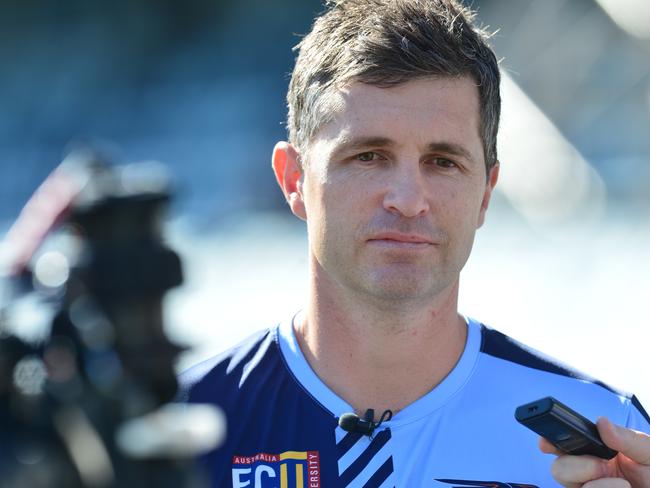
“I’ve always asked the AFL why the Level 4 got scrapped,” Longmuir said.
“As an assistant one week turns into the next and you do the same thing with your players. You’ve got a process for reviewing, a process for preparing and game day.
“So you don’t get an opportunity to elevate your thinking. But Level 4 gave me that opportunity.
“You do different modules which gets you thinking about how you would run a training program, a list management committee, training techniques and how you’d structure your coaching group.
“I became close to Monty (Brett Montgomery) and Jade (Rawlings) and we’d have those conversations together because we’d had different experiences.”
Longmuir left the Eagles after six years – including five as forwards coach in charge of Josh Kennedy, Mark LeCras, Jamie Cripps, Jack Darling and Josh Hill – destined to be a senior coach.
He got a taste of football in Victoria for two years. In 2019 Longmuir met with St Kilda in 2019 but returned west to replace Lyon.
His Fremantle application included a 90-page document.
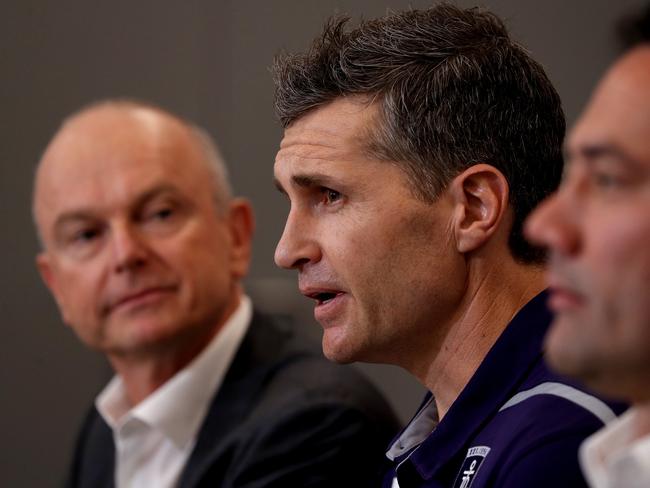
Those who know Longmuir best describe him as ego-less and underrated.
They say Longmuir is a salt-of-the-earth guy and the longer you spend with him the more you like him.
But in small doses he can come across as dry – particularly in short press conferences – and that has been weaponised against him.
Does Longmuir have the emotional range to be a senior coach?
“I’ve heard that comment,” Longmuir said.
“This is the thing I understand about criticism of senior coaches. The hardest criticism comes from those who have never done it.
“I don’t see Bucks and Leigh Matthews making these outlandish comments. They don’t because they know how hard the job is.
“But I don’t get too caught up in that because I would rather an emotionally-controlled coach as a player than a guy who’s unhinged.
“I’m working with a young group, we’re hoping we can keep this group together and become an older group as we go, and maybe an older group might need different strings pulled.
“But I think I’m pretty good at reading the group and adjusting my message according to what the group needs.
“I don’t put my arm around the players all the time. I give them a whack if they need a whack.”
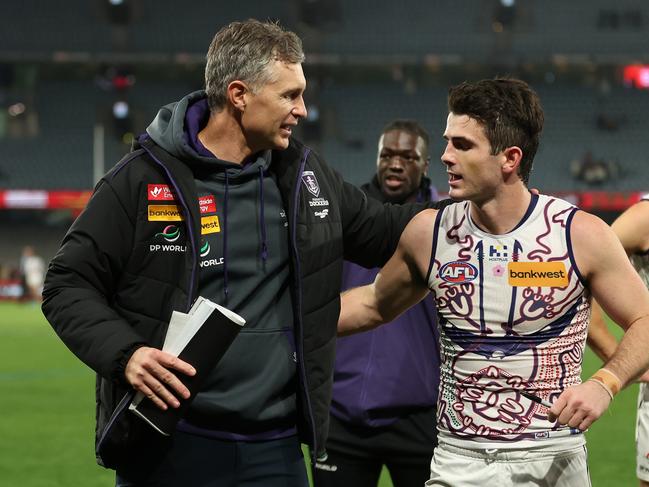
The personality of Fremantle’s squad is arguably a reflection of its coach. It doesn’t seem like there is a Tom Papley or Izak Rankine in the locker room.
“We really haven’t got many extroverts in our playing group, and those extroverts definitely aren’t in our front half,” Longmuir said.
“There’s a couple in our back half. I just don’t know whether that’s necessary for winning a flag.”
So how did Longmuir respond to the shock derby loss to West Coast in round 6?
“I told the players I wanted to believe we were the round 1-5 team and for whatever reason we weren’t on that night,” Longmuir said.
“So the person I look at in those situations is me. What could I have done better to prepare the players? Clearly something was wrong during the week.
“You’ve got to find the balance between giving the players a whack and picking them up and getting ready to go the next week.
“So it was probably more of a ‘Disappointed Dad’ mode.
“We chose to focus on a few things in our game that were highlighted in the West Coast game, but had been trends for a couple of weeks.
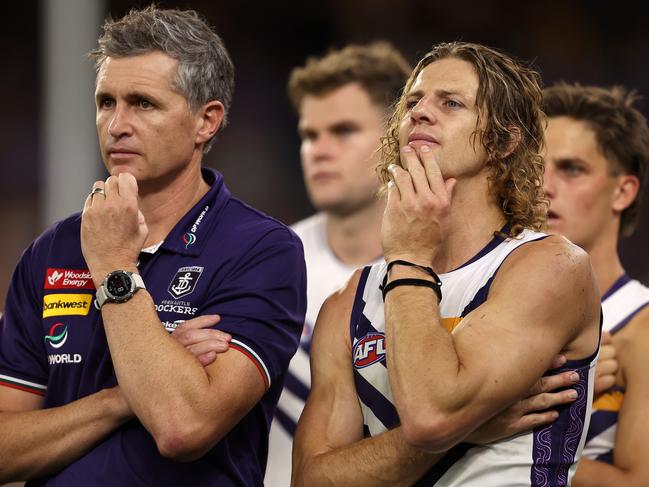
“In the first quarter of that game we had 16 inside 50s to seven and we’d scored three points and they’d scored four goals.
“We’ve had 16 and couldn’t connect, that’s deflating for the team.
“I tend not to overreact. People internally say it’s a strength, but externally it gets criticised.”
Longmuir’s measured – rather than emotional – response has been followed by three stabilising wins and one loss to ladder-leader Sydney.
Next up is Collingwood on Friday night and it was at the Magpies in 2018 where Longmuir learned the importance of staying calm.
Coaching for his life, Nathan Buckley remained unflappable after losing to Hawthorn and GWS.
“The Hawthorn game would have been an easy one to go this is not working and panic, and (Bucks) didn’t panic,” Longmuir said.
“He just kept really calm and reinforced some of the things we did well.”
The Pies led GWS by 11 points in the fourth quarter, but with Darcy Moore and Tim Broomhead injured they were overrun.
“We actually played a really good three quarters against GWS and, again, he was calm and reinforced the positives and sold really strong belief in the playing group,” Longmuir said.
Collingwood and Carlton were both 0-2 when they met on a Friday night in round 3.
“The lead-up felt like it was more about the loser rather than the winner and if you won you got off the hook and if you lost they were going to come after you with pitchforks,” Longmuir said.
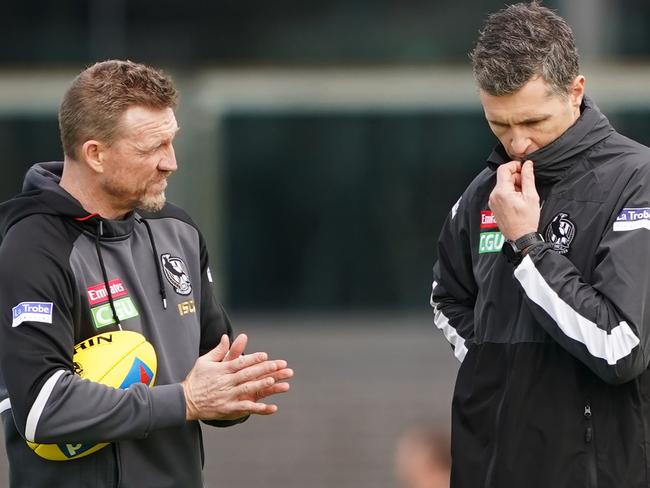
“Eddie (McGuire) came in to talk about the rivalry and the history between the two clubs and I just remember going to the game and it was on.
“We won – and that was the harshest review we’d had.”
The Magpies kicked 10 consecutive goals to turn a 14-point deficit into an unassailable 41-point lead.
“I remember ‘Bucks’ showing some really good contest clips – but he said, ‘Look, boys we only played 45 minutes of good footy’.
“Round 4 we went to Adelaide Oval and defended really, really well. Then we were 2-2 and belief and confidence grew and they were away.”
And away they were. The Magpies made the grand final a year after finishing 13th.
Was it the Longmuir effect?
“I wouldn’t say all the ideas around team defence were my own. But I definitely brought a different level of thinking to how we could do the same things in different ways,” he said.
“I think they were doing a lot on work ethic and grunt and I offered a lot of method.
“But I wasn’t the only one. I get credit because I’ve taken the next step and am now a senior coach, but Matty Boyd and ‘Buddha’ Hocking had a big say in that as well.”
Longmuir’s homecoming at the Dockers arrived 21 years after the club drafted him.
Then Covid hit, the AFL season was shutdown and Longmuir lost his first four matches.
“Training with eight players in each pod wasn’t ideal trying to embed a new game plan,” Longmuir said.
“I remember we played GWS on a Sunday at home and then Richmond on a Thursday at the Gabba.
“I was giving the players the address in the huddle at three quarter-time, and we were actually playing well, and all I could hear was ‘Dimma’ (Damien Hardwick) screaming at his players at the next huddle.
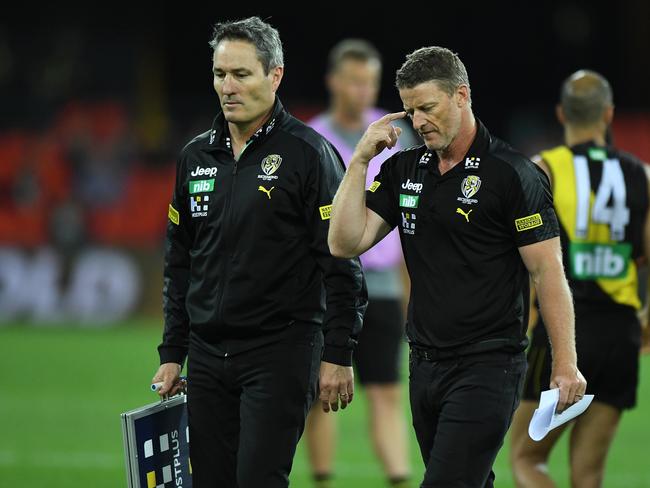
“It was a positive for the way we were playing, especially given they were ‘the’ team back then.”
The Dockers had kicked the only two goals of the third quarter to get within six points. But Hardwick’s spray worked as the Tigers kicked clear.
“I was so disappointed we lost that game because we played really well. Maybe off a four-day break we ran out of legs, but they were just too good for us.”
Walsh loved US sport and now Longmuir looks abroad for marginal gains.
How do NFL clubs integrate storytelling and set up their week? How does the NBA set up development plans and resources for teenagers taken out of college?
“I hadn’t even heard of some of the American sports back then, but (Walsh) would just talk about coaches in America,” Longmuir said.
When the Dockers eat together there is a no mobile phone rule.
“That’s maybe from the (San Antonio) Spurs mentality of when you’re in, let’s connect,” Longmuir said.
“It’s an opportunity to have a conversation, see how a person’s day was, how their life is going rather than being consumed by your phone when there’s plenty of time in the day for that.
“Then it evolved into when you’re getting treatment from a physio learn about your body – don’t be on your phone. Be attentive.
“Last year it was no phones in the gym, just leave them outside. The only reason they crept into the gym was because we were using them for monitoring loads.
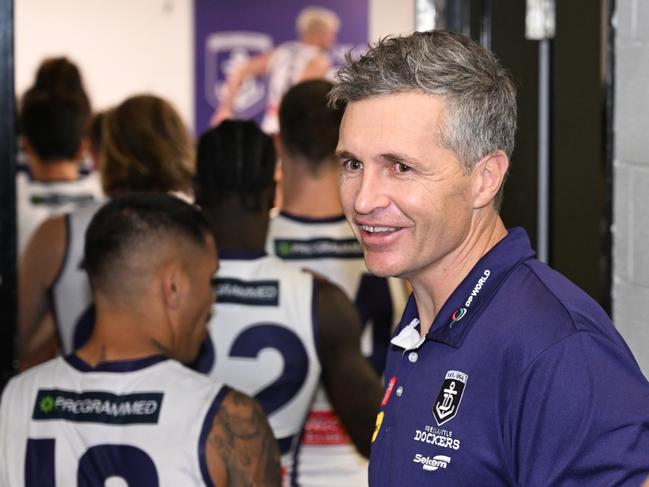
“But now we’ve got iPads and don’t need them, so don’t bring them in.”
Longmuir’s coaching values centre on the environment.
“I don’t think it’s my job as a coach to directly motivate players. Players are motivated by the environment,” he said.
“Self-motivation comes from three things – a sense of connection, a sense of autonomy and a sense of competence. So try and set the environment up filled with those things.”
Removing unnecessary anxiety is important for connection. That is why Longmuir would never shame an individual in a team meeting.
“Have an individual conversation with that player, which is much more meaningful and much more impactful rather than whacking him in front of the group,” Longmuir said.
Long and boisterous cheers erupted when Longmuir’s men learned he had re-signed in March.
The carry on endorsed Longmuir and his environment. It also embarrassed the reserved but respected leader.
“I don’t like the attention on myself,” Longmuir said.
“It was a pretty awkward couple of minutes.”
More Coverage
Originally published as Shy kid to Fremantle coach: Justin Longmuir on footy, the farm and finding his voice




